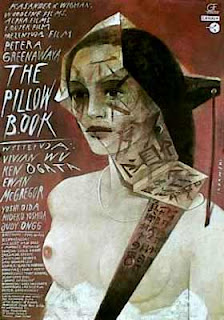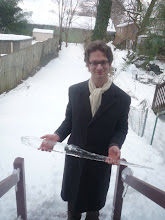I’ve learned the hard way that most critics don’t really like most other critics, and nowhere is this more evident than in their reviews of The Pillow Book. The Pillow Book is either a beautiful celebration of traditional cultures, a dark yet strangely touching erotic story, and one of the best films of the 1990s; or else it’s the cancer that is killing film and doesn’t even rise to the level of fetishistic pornography. There is no middle ground, and if you think there is, you must be one of THEM. Or a critic from the Christian Science Monitor. One or the other.
As with so much else, the drama over The Pillow Book was originally, in essence, Roger Ebert versus Everyone Else in the World. Ebert, a Japonophile who frequently gets the ‘one of us!’ treatment from anime geeks, really loved it, saying that it was a film for the ages and a dark, beautiful exploration of certain aspects of Japanese culture (including, yes, some of the more hentai aspects of said culture) from an original perspective that wasn’t really British but wasn’t really anything else. Everyone else in the world probably left the theatre thinking ‘what the fuck did I just see?’ Unless they were watching Batman and Robin instead, in which case they still left the theatre thinking ‘what the fuck did I just see?’, just for different reasons.
But Ebert was right about North; that movie really did suck and really was beneath Rob Reiner’s true abilities! So maybe he was right about this! Right? Right?
TIME’s Richard Corliss thought so, and like Ebert he could find almost nothing bad to say about The Pillow Book. Many other critics did not agree.
The strange thing is, it really didn’t start out as a controversy. Film critics disagree on movies a lot, actually, especially if one of them is Ebert (or the late Gene Siskel, who actually liked The Pillow Book as well). It was only when the Internet became a more end-user-oriented place and when Japanese things started to become one of the Internet’s specialities that people who hated this movie started hating it TEN TIMES MORE, in one instance saying:
‘If your idea of a good movie is watching Ewan McGregor walking around naked with his uncut equipment flopping around going from sex with one fat old asian man to another then yeah you’ll love this movie and you can hide behind the same critiques about the films mis en scene that these other critics are blowing hot air about. Otherwise forget it. This film is both boring and disturbing and not in a cool way either. There are some colorful visuals with the beautiful young starlet and her fetish for writing Mandarin on bodies but it doesn’t save the film. How are we supposed to take him seriously as Obi Wan after seeing this?’
First of all, I don’t think that the fact that Ewan McGregor is uncircumcised is really relevant to the quality or lack thereof of any movie that he is in, from Trainspotting to The Island. But that could just be what is apparently (according to my ‘friends’) my ‘Victorian antisexualism’ talking. Second of all, I actually like Mr McGregor as an actor, but how were we supposed to take him seriously as Obi-Wan after finding out that he wasn’t Sir Alec Guinness? Third of all, he only has sex with one fat old Asian man. Fourth of all, Mandarin is a language, not a script. The script in question is kanji, and the characters use it to write Japanese, not Chinese. Fifth of all, there are many legitimate criticisms to be made of The Pillow Book; the mis en scene is not among them. Paul Greenaway, who made this movie, is actually a visual rather than a literary artist, and it shows. These are the film’s strengths, not its weaknesses. It’s like faulting Simoun for the accordion music. Sixth and last of all, it wasn’t this review, but one of these same Amazon reviewers also claimed that Steerpike is the ‘good guy’ of Gormenghast.
I’ll just…let that one hang itself.
This is not to say that people who like The Pillow Book can’t be equally ridiculous, because they can. Oh, they so can. I’ve seen people say ‘it just wasn’t my thing’ and get called stupid philistines who should shoot themselves to remove themselves from the gene pool! One wouldn’t think this sort of a movie would inspire such fanatical loyalty, but people get worked up about a lot of strange things. And this one is just…NO:
‘If you love to stare at nude luscious men, this is the VIDEO! I enjoyed it for hours! All the other reviews were right, this video is GREAT. The quivering male organs...the gleam of light on supple hairless skin...the curves of each exquisite muscle...it’s ART in its purest form. If you love to examine the nude male, and marvel at its beauty, this is a GREAT video for you!’
NO. LEARN TO FILM STUDIES.
There really is a shocking lack of research in these reviews. The original Pillow Book (the work of literature, that is) is described as an ‘erotic novel’. Which it is not. Really is not. It’s a book of lists, basically. And one person claims that Sei Shōnagon lived in the eighth century, which she didn’t.
Let me lay it out: The Pillow Book is a very specific sort of thing. If you feel that you will enjoy, be aroused by, be shocked by, be moved by, or otherwise derive benefit from a dark love story about the publishing industry in which Ewan McGregor and Vivian Wu copy the works of Sei Shōnagon on to each other’s bodies, good. You’ll like this movie. If that does not strike you as in any way appealing, don’t watch it in the first place, and if you are somehow forced to, don’t say I didn’t warn you. Just bear in mind that there is, in fact, more to the movie than McGregor walking around naked. There is also Wu walking around naked. And other people walking around naked. And, more seriously, tenth-century literary studies. And a love story. And a revenge story. And as for the most original thing about the movie—the calligraphy sessions—I actually quite enjoyed them. The actors involved (at least until we get to the sumo guy in the climax) are mostly fairly attractive, especially Wu. The calligraphy is beautiful, the literature is classic, the revenge plot is ingenious; I don’t myself understand what’s not to like. If you still think it’s pretentious, pornographic, or both, or that Ewan McGregor is metaphorically raping Sei Shōnagon from beyond the grave, that’s your right. Just don’t expect Heian diehards, or people with language fetishes, or people like me who fall into both categories, to agree with you. After all, we don’t expect you to agree with us.
Besides, how often is a dramatic movie seriously commended for ‘interesting use of nudity’, anyway?








